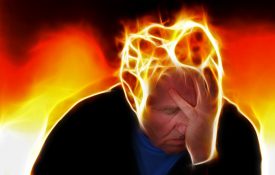-
Combining Cannabis and Alcohol Amplifies Crash Risks
Cannabis and alcohol are the drugs most commonly detected in the systems of drivers involved in crashes, according to the National Highway Traffic Safety Administration. Decades of research has looked at the impairing effects of drinking alcohol and driving, but little research has investigated how these two drugs affect behavior behind the wheel when combined. A team of Australian researchers, led by psychological scientist Luke Downey of Swinburne University of Technology, carried out a double-blind, placebo-controlled experiment to find out how drivers react when these two drugs are combined.
-
What Poverty Problem? Everyone I Know Has Money!
Pacific Standard: There are good reasons why wealthy people are often reluctant to support policies, and political parties, that aim to distribute wealth more widely. For one thing, it isn't in their short-term self-interest (as their taxes would likely rise). For another, it goes against the conservative ideology many of them hold (which equates poverty with laziness or a lack of moral character). Newly published research has identified yet another, even more basic explanation of why, in spite of the disturbing rise in income inequality, they tend to support the status quo.
-
Tweak The World
NPR: There are lots of big problems in the world: climate change, poverty, war. We have done shows about those problems. And we will do more. But today's show is about really, really small things. We ask some of the smartest people we know what little thing they would change to improve the world. Listen to the whole story: NPR
-
Do You Know What Your Time Is Really Worth?
The Wall Street Journal: What is your time really worth? It is a day-to-day trade-off. We are constantly confronted with opportunities to save time by paying more money, and vice versa. Should you send out your laundry? Take the faster, more expensive flight or train? Do additional freelancing or consulting work? Now, more than ever, with the creation of TaskRabbit and virtual concierge services, there are opportunities to outsource every task for a fee. But putting a dollar value on your time requires more than dividing your pay by hours worked. It requires thinking deeply about the trade-offs you are willing to make.
-

Burnout Leaves its Mark on the Brain
Chronic stress seems to dampen people’s neurological ability to bounce back from negative situations—causing even more stress.
-
Weiß ich doch (I know!)
Süddeutsche Zeitung: In Arztpraxen und Krankenhäusern sind sie gefürchtet, im sonstigen Leben gelten sie als elende Nervensägen. Die Rede ist von Menschen, die immer Bescheid wissen, überall den Durchblick haben - und dies andere auch deutlich spüren lassen. Sogar wenn sie medizinischen Rat suchen, sagen solche Zeitgenossen dem Arzt, was er gleich bei ihnen finden wird und wie sie am besten behandelt werden sollten. Was diese selbsternannten Experten jedoch nicht ahnen: Im Gefühl ihrer eigenen Überlegenheit bemerken sie oft nicht, wie sie sich grandios überschätzen und gerade in Gebieten, in denen sie sich besonders gut auszukennen meinen, fulminant danebenliegen.

